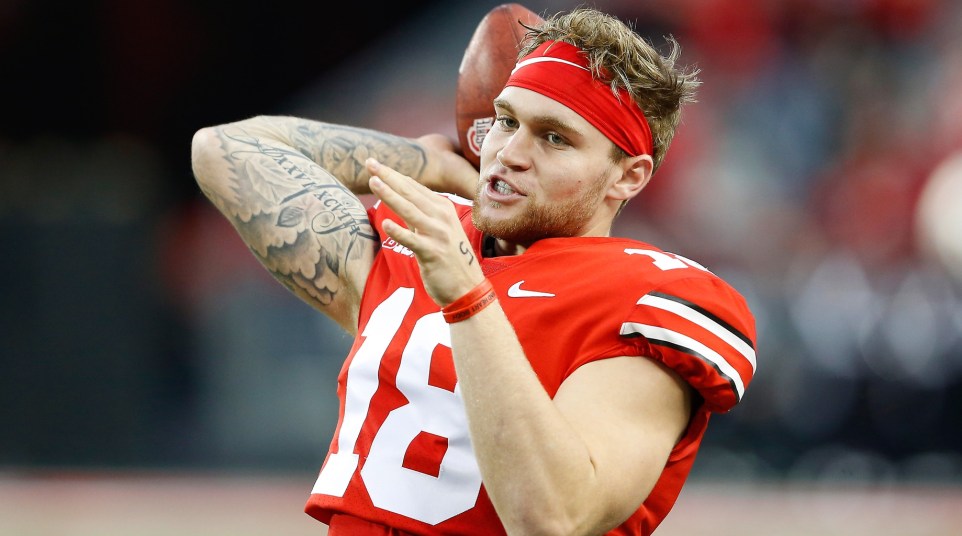
There's something that worries me about this Tate Martell ruling, and it isn't free agency
News that Tathan Martell would be granted immediate eligibility at Miami after transferring from Ohio State seemed to be the monumental final piece of the college football free agency puzzle. Some breathed a sigh of relief that the puzzle was in place while others felt unrest about the next unsolved puzzle that awaited.
I’m of the belief that a mess awaits. Puzzle pieces are scattered all over the table and it’ll take a long time to put everything together.
But that’s not my way of saying I fear free agency in college football. It’s not a perfect system, though I do believe there will be many positives with it. I’m more surprised that it took until 2019 for the NCAA to say, “eh, do what you’ve gotta do.”
What I fear is something different. This transparency that’s supposed to exist between a player and a coach — whatever that remained — could cease to exist. The increase of deceiving players to try and get them to stay has the potential to create more dishonesty than ever in the sport.
Think about it. There is now more incentive than ever for a coach to promise playing time to a player. Coaches might feel like they have to do this just to ensure that a backup stays on the roster. After all, you need roster depth. If players can transfer without penalty in the middle of August when they realize they aren’t on the depth chart where they want to be, what’s going to keep them around?
In Martell’s case, the Miami Herald reported that Ohio State made no desire to keep him around once he informed the program of his desire to transfer when Justin Fields arrived in Columbus. That was reportedly significant in the NCAA’s ruling, according to Martell’s lawyer, Travis Leach. In fact, Leach claimed that Martell’s situation was “unique” and that he didn’t think it would lead to “wholesale change.”
Sports Betting in Big Ten Country
Sports betting in Ohio is officially launching on January 1, 2023.
Pre-registration is now open at FanDuel Ohio for an extra $100 bonus. Go pre-register now.
21+ and present in OH. Gambling Problem? Call 1-800-GAMBLER.
Sure, guy.
Contrary to what Leach suggested, it’s a relatively common occurrence for a new coach to take over and bring in a transfer. Martell believed he was in line to become the starter until Fields showed up. He didn’t like it, so he left. Not that unique.
But I found it interesting that the very first detail included in the report and why Martell got a potentially revolutionary ruling from the NCAA was that “Ohio State made no efforts” to keep him. It was almost like Martell went into the transfer portal just to see where he stood with the new coaching staff. The Buckeyes didn’t chase after him and he found someone else who would.
I’d bet there’s no way that the Buckeyes thought Martell would get immediate eligibility elsewhere as an undergraduate transfer. He didn’t have an ace in the hole like Fields, who played the racism card. Not surprisingly, the NCAA looked at it and caved because denying it would’ve incited an unwanted, unnecessary race debate.
What if Ohio State knew that Martell could play immediately elsewhere? What if every coach knew that players could up and leave at a moment’s notice if they didn’t like how many drills they did with the third-teamers one day? I think that changes things.
Suddenly, I think coaches will think long and hard about giving more backups reps with the first-teamers just to put it in the back of their minds that they could start. Well, at least the ones they want to stick around.
By the way, just because a coach wants a player to stick around doesn’t mean they want them to start. That’s where the slippery slope comes into play. Obviously some of that exists already, but there would be even more empty promises in a system that allows immediate eligibility for all transfers. With that, there could be more nasty breakups of players calling out coaches after transferring (remember that players can speak to the media at their own discretion if they’re in the transfer portal).
It just seems like the player-coach relationship could be taking a turn for the worse. Not everybody is going to do the Dabo Swinney thing and give someone like Kelly Bryant an opportunity to transfer (it’s also much easier to do that when you have the highest-rated quarterback recruit of the 21st century on your roster already).
Could this also force coaches’ hands a bit sooner if they have a handful of players enter the transfer portal immediately after the season ends? Sure. That’s basically what Martell did.
And say what you want about Martell now being at the fourth school that he either committed to or played for, but if he starts immediately at Miami and looks the part, many will follow in his footsteps. He was smart to take a step back and realize that “oh, it’s probably not good for me when a new coach hand-picks the most highly-coveted transfer on the market to play my position.”
Martell wanted to compete. He also wanted to have a chance, and not have a brick wall standing between him and the path to a starting job. He’s not the only one who feels like that.
Some players will have the fortitude to see the brick wall when it’s in front of them. They won’t let coach speak cloud their vision.
Others won’t see the brick wall until it’s too late. That won’t be a pretty sight.
